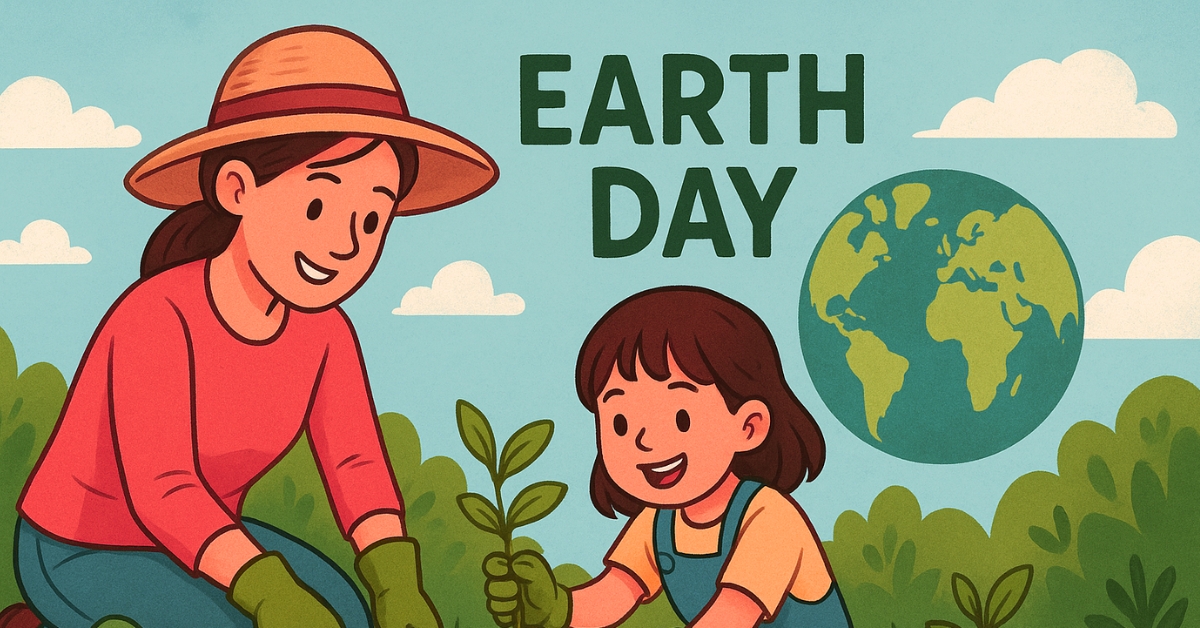Introduction: Why Bonding Matters
“Sometimes the little moments become the biggest memories.”
Parenting is not only about guiding children through life’s challenges but also about creating moments of love, laughter, and togetherness. In a world where screens often steal our attention, finding meaningful parent-child bonding activities has become more important than ever. One activity that beautifully combines fun, education, and love is gardening—especially when tied to special occasions like Earth Day.
Gardening may look simple, but when done together as a family, it becomes a journey of learning, bonding, and healing. Let’s explore how parents and children can celebrate Earth Day while planting seeds of joy, responsibility, and togetherness.
Earth Day: More Than Just a Date on the Calendar
Earth Day, observed every year on April 22, reminds us to care for our planet. But beyond recycling campaigns and awareness programs, Earth Day offers families a chance to practice eco-friendly habits at home.
For children, Earth Day can be an exciting opportunity to:
- Learn the value of nature
- Understand sustainability
- Experience hands-on activities that protect the planet
For parents, it’s a perfect time to engage in bonding activities that teach responsibility and kindness while creating lasting memories.
And what could be better than gardening—a celebration of life itself?
Gardening as a Parent-Child Bonding Activity
1.A Living Classroom at Home
Gardening turns the backyard (or even a balcony) into a magical classroom.
- Math: Measuring soil, spacing plants, and counting seeds.
- Science: Photosynthesis, plant growth cycles, soil nutrients.
- Biology: Understanding ecosystems, bugs, and pollination.
Instead of textbooks, children get hands-on lessons, guided lovingly by their parents.
2. Quality Time, Away From Screens
In a time when children are glued to phones, tablets, and gaming devices, gardening offers a refreshing escape. Planting seeds, watering them, and watching them grow allows parents and kids to reconnect—without Wi-Fi interruptions.
3. Emotional Connection Through Conversations
While planting or pulling weeds, families naturally start talking. Parents can share stories from their childhood, listen to their child’s dreams, or laugh together. These conversations, though simple, are the ones kids will carry in their hearts forever.
4. Teaching Life Skills
Gardening isn’t just about plants—it’s about patience, responsibility, and consistency. When children see the results of their care—a sprouting seed, a blooming flower, a ripe tomato—they learn the value of effort and dedication.
Sweet Gardening Ideas for Families
You don’t need a big yard. Even a small corner can become your bonding spot. Here are a few fun and creative ideas:
- Mini Kitchen Garden: Start with easy plants like tomatoes, cucumbers, or herbs. Children love seeing their food grow.
- Flower Pots of Love: Pick colorful flowers like sunflowers or marigolds and let kids paint the pots with bright designs.
- Vertical Herb Garden: Use recycled bottles or cans to create a hanging herb wall with mint, basil, or coriander.
- Tree of Memories: Plant one tree together every Earth Day. Each year, watch both the tree and your child grow taller.
- Storytime Garden: Dedicate a plant to each family member and share stories while watering them.
Educational and Emotional Benefits
Academic Growth
Gardening secretly teaches:
1. Numbers (counting seeds)
2. Shapes (leaves, pots, flowers)
3. Colors (nature’s palette)
4. Problem-solving (what to do if plants wilt)
Emotional Growth
1. Builds patience—plants take time.
2. Boosts self-esteem—children feel proud of nurturing life.
3. Encourages gratitude—appreciation for nature and food.
Family Growth
1. Shared teamwork strengthens trust.
2. Joint goals bring cooperation.
3. Unplugged moments create deep connections.
The Humanistic Side of Gardening
Beyond learning, gardening offers something deeper—togetherness.
Imagine this: a child’s tiny hands covered in soil, a parent gently guiding them, laughter filling the air. These are the precious slices of life that children remember when they grow older.
Gardening becomes more than an Earth Day project—it becomes a tradition of love, a way to slow down, and a chance to remind each other what truly matters: family.
Why Parents Should Prioritize Bonding Activities
Research shows that kids who spend quality time with parents are:
- More confident
- Better at communication
- Stronger in problem-solving skills
- Emotionally healthier
In today’s busy schedules, carving out these bonding moments can feel hard. But simple activities like gardening remind us that bonding doesn’t need grand plans—it just needs presence, patience, and love.
FAQ
Q1: What are the best parent-child bonding activities at home?
A: Gardening, cooking together, storytelling, board games, and DIY crafts are some of the best.
Q2: How does gardening help in bonding?
A: Gardening involves teamwork, communication, and shared responsibility, making it a natural bonding activity.
Q3: Can gardening be done in small spaces?
A: Absolutely! Use pots, hanging planters, or vertical gardens if you don’t have a yard.
Q4: Why link gardening with Earth Day?
A: Earth Day emphasizes environmental care, and gardening is a hands-on way for families to contribute positively.
Final Thoughts: Planting Seeds of Love
Parenting is a journey of love, patience, and togetherness. Every seed planted in the garden mirrors a seed planted in a child’s heart. As parents and children nurture those plants, they are also nurturing their relationship.
This Earth Day—and every day—let’s celebrate not just our planet but also the gift of family. Gardening is one of the most rewarding parent-child bonding activities, creating memories that will bloom for years to come.
So, grab some soil, pick up a seed, and plant not just for the Earth—but for love, laughter, and the bond you share with your child.




